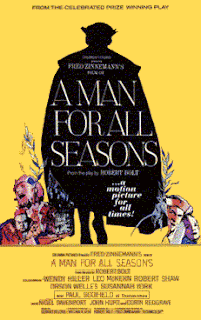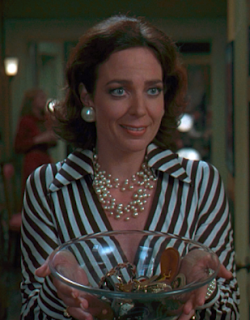Classic Film Review: A Man for All Seasons
Dennis's Review:
Are we supposed to think of Thomas More as a saint or as a fool? In a memorable scene, Thomas More asks his son-in-law if he would cut down all the laws in England to catch the devil. When his son-in-law replies that he would, Thomas asks him what he’d have to protect him when the devil turns round on him. But, of course, Thomas carefully tended his forest of laws and had nothing to protect him from King Henry, the devil’s rather on-the-nose earthly approximation. Paul Schofield plays Thomas More as the infallible logician, confidently asserting the supremacy of the law, but in the end he’s shown to be naive or worse.
In that I’m reminded, strangely, of King Edward from Braveheart, another character whose impeccable logic met constantly with an inconvenient dose of reality. Edward is a Machiavellian who is frustrated by the power of something beyond soldiers and money. Thomas, conversely, is a sort of romantic who underestimates the power of soldiers and money. The difference between them is that Thomas has God on his side. God is the key character in A Man For All Seasons. Without God, Thomas is simply a man who sacrificed himself and his family on the altar of his own self-righteousness. With God, he goes to heaven and becomes a saint, while al his enemies die eventually anyway.
A Man For All Seasons is a great film because it makes us wrestle with a difficult character like Thomas More. A lesser film would have us rooting for Thomas to hold out for his ideals. Paul Scofield gives us as convincing an argument as he can for Thomas’ case, but I still find myself begging him to simply sign the paper and go back to his wife and children and servants.
4 Stars ****
4 Stars ****
Kevin's Review:
What
is a Man for All Seasons? Is it a man who stays
true to himself despite changing “seasons?” For this is how we
think of Sir Thomas More: the ultimate man of conscience. But the
title is Erasmus's:
“Though your remarkably keen intelligence places you worlds apart from the common herd, still the incredible sweetness and gentleness of your character makes you able and willing to be a man for all seasons to all men."This suggests the opposite: A man for all seasons is, perhaps, the charmer, the chameleon. The title is a paradox.
 |
| Orson Welles as Cardinal Wolsey |
Certainly
one must be flexible to thrive (or survive) at Henry VIII's Court. But there is a difference between a
man who will adapt to anything, and a limber man with a spine of steel: a tree for all
seasons, rooted below, but changeable above...as opposed to a
tumbleweed blowing in the winds.
Hampton court was full of opportunistic tumbleweeds: ambitious-at-all-costs Richard, in particular, who purgers himself which ultimately sends More to his death. Others are simply practical, and go-along-to-stay-alive, and not even More can blame them. Or perhaps everyone there is rooted by some trump value, something that ties them to earth: for Richard, ambition, for the King, legacy, and for More's family it is love of family, and Thomas in particular.
But More, while he (foolishly) relies on the letter of the Law to keep him alive, is not, ultimately, rooted to the earth -- his allegiance, even above his family, and above his King, is to the Unseen realm of God. This is why, in England, he is a Saint.
Of course, in Hilary Mantel's Wolf Hall, More is rendered as a religious fanatic, a killer of heretics himself, who resembles more a stubborn toddler than a man of truth.
In this lovely, intelligent film, there is a sequence in which prisoner More watches the seasons change outside his cell window, is led down a hallway, and witnesses a jovial Court Party, a reminder of the earthly life given up. This is the most moving and truly cinematic part of this filmed play. In rejecting this world, More is gambling on a heaven and the transcendent truths implied in its existence. But in our secular age, is he still standing for something existential and eternal, even if his consciousness is fated to disappear?
To what do we owe our very-real-families, and to what do we owe our un-provable souls? This gorgeous film, rich with imagery and full of powerful symbolic costumes and performances, shows to us in cinematic glory the wondrous riches of our material existence. What is More standing for? Is it merely the black abyss of the end screen we see after the chopping of his head? The living shall never know for sure -- but there's beauty in that, too.
Three and a Half Stars ***.5




ReplyDeletemagnificent issues altogether, you simply received a brand new reader. What might you recommend about your post that you made some days ago? Any certain? yahoo email login